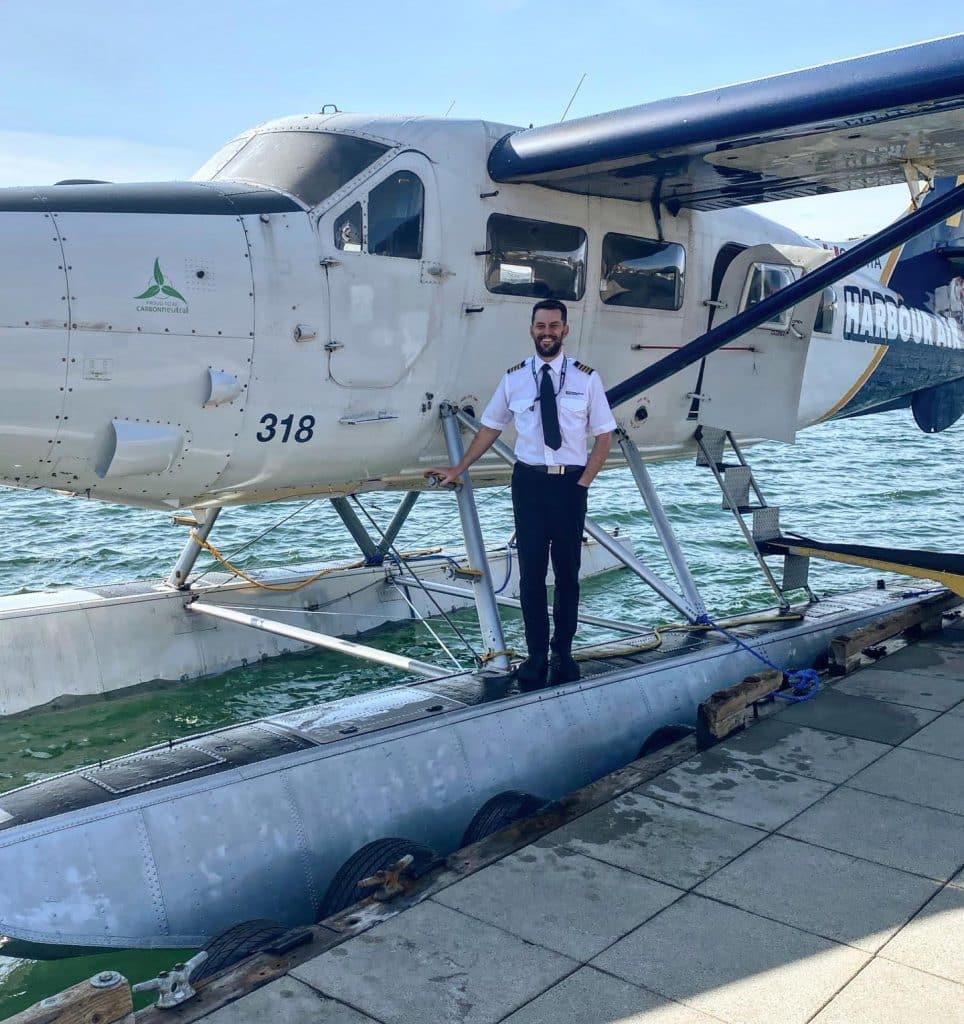EFC Alumni
Welcome to the EFC Alumni page, where we celebrate the outstanding individuals who have embarked on transformative journeys with us at the Edmonton Flying Club (EFC).
As you explore this page, you will discover a rich tapestry of stories from our esteemed alumni who have soared to great heights in the aviation industry and beyond. From pilots to aviation executives, engineers to entrepreneurs, our alumni embody the spirit of excellence, determination, and passion that defines the EFC community.
Join us as we showcase the remarkable achievements and contributions of our alumni, inspiring the next generation of aviation enthusiasts to spread their wings and reach for the sky.
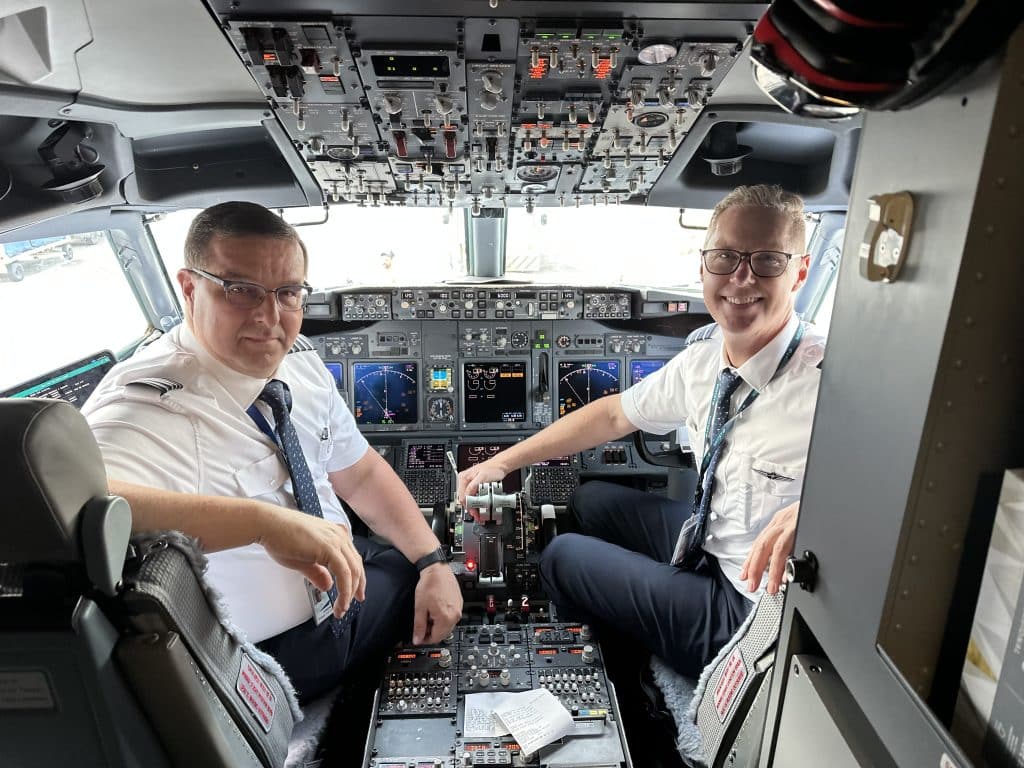
ALUMNI BIOS
1.WHO AM I AND WHERE AM I NOW?
I am a born and bred Alberta boy and lived in St. Albert from childhood until 2008. Currently, and since January 2013, I live in Hong Kong and work for Cathay Pacific as a Relief Command Qualified First Officer on the Airbus 350 and 330. I started flying at the age of 20 in 2005, undertaking the Grant MacEwan College (now University) Aviation Management Studies Program, and completed my PPL, CPL, and Multi-IFR at EFC. I finished my training in 2007 at EFC. Whilst I was training, I managed to get a job as a dispatcher at EFC and then eventually became Chief of Dispatch and Line. I then discovered and attracted a company called SkyWords to base their operations out of EFC at CYXD and was hired as their surveillance pilot. In early 2008, I left Canada to finish my Bachelor of Business degree in Australia and after converting my license I worked as a sky dive pilot in a beautiful slice of the world called the Sunshine Coast. In 2012, I was hired by Cathay Pacific and after a training program in Adelaide, Australia, I relocated to Hong Kong in early 2013 where I remain to this day.
Shameless plug – if you want to follow my career, find me on Instagram at adam.aeroplane
2. WHY DID I CHOOSE EFC?
I chose EFC because after some investigation with the competing flight schools in the area, I thought it was the best choice. EFC had a large fleet and adequate office, briefing and classroom space. The aircraft were well maintained by both maintenance and dispatch and line. The costs for the EFC rentals and programs were competitive. The last, best part about EFC was the people. Back in 2005, as I am sure it remains today, EFC hired high calibre people, not only when it came to awesome instructors, but also in dispatch, maintenance, and the office. EFC also had a great community atmosphere where employees, students and members did not just interact when it came to flying, but also acted as a genuine club or community for fly-ins, hangar hockey, BBQs, and opportunities to fly with many people in a number of club and private planes.
3. HOW DID EFC HELP MY CAREER?
EFC gave me all the tools I needed to be successful to get through my licensing. I was provided with great instruction from all of my instructors through all of the ups and downs, and was provided with all of the resources I need to learn and be successful. EFC gave me opportunities to work at the club itself, to network with many in the industry and to jump start my career by bringing in other opportunities, like SkyWords. I’m now operating one of the largest and most advanced airliners in the world, and I know I couldn’t have done it without the great start I received from EFC.
4. WHAT IS YOUR MOST MEMORABLE EXPERIENCE AT EFC?
To be honest, there are too many to name, so I’ll just list a few:
- My 300nm X-country to Seattle, WA, via Golden, Kelowna, and Vancouver
- Joining a friend on their 300nm X-country to Idaho, via Montana
- Hour building in all sorts of EFC aircraft with countless friends, pilots, and co workers in Alberta, BC and Saskatchewan
- Early mornings in the summer working on the ramp before the club opened, pulling the planes out of the hangar in the quiet morning sun
- Late winter nights stacking the hangar – like an intricate game of Tetris
- Hangar Rash – hangar floor hockey tournaments
- BBQs – including EFC 80th Anniversary and annual Wings Banquets
- Mountain Endorsement and Night Rating
- Ferrying aircraft for the club back from Springbank using my shiny new IR
- Competing in the Webster Memorial
5.IF YOU HAD TO GIVE ADVICE TO SOMEONE STARTING OUT WHAT WOULD YOU SAY?
The best advice I can give starting out is no matter what to persevere and keep trying. There are going to be all sorts of ups and downs ranging from passing a license or rating; to being unable master a technique as fast as you thought; to the cost of entering this profession (or hobby); to job opportunities and subsequent job losses – and then more job opportunities. Aviation is truly a fickle industry, but it is also incredibly rewarding. I have had so many amazing experiences and met so many great people that I could never regret the path I’ve taken in my life. I’ve also been incredibly lucky, but personally a lot of that luck depends on perseverance, so keep trying, and when times get tough, don’t give up. A mistake or error just means you are on your way to perfecting whatever you are trying to accomplish. You only fail when you stop trying.
Finally, be open to where this path takes you. I had never planned to become an airline pilot or ever live in Asia. I would have been more than content to work in corporate/executive aviation based in Canada, but here I am and I wouldn’t think twice about giving it back.
 1. Who am I and where am I now?
1. Who am I and where am I now?
 1. Who am I and where am I now?
1. Who am I and where am I now?
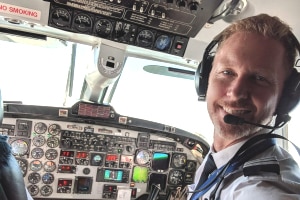 1. Who am I and where am I now?
1. Who am I and where am I now?
1. Who am I and where am I now?
I grew up (mostly) in Edmonton, and since getting into aviation I’ve moved around from Manitoba, to Southern Ontario, Northern Alberta, and now I’m living in Vancouver as DHC-3T Turbine Otter Captain for Harbour Air.
2. Why did I choose EFC?
I chose EFC because of its reputation and aircraft fleet. I was confident in the teaching that I would be getting at EFC, and the quality of the instructors. I started (very briefly) when EFC was still located at City Centre airport in Edmonton, and then got back into flying after EFC moved out to Parkland Airport.
3. How did EFC help my career?
EFC not only helped me earn my PPL, but also gave me my first job in aviation. I worked as a dispatcher at EFC in 2015 and 2016, and I have no doubt in my mind that the experience I earned working around aircraft has been invaluable in helping my resume stand out among other low-time pilots. I also can thank EFC and the staff there for pursuing my CPL, helping me switch careers into aviation. I’ve kept in touch and worked with other EFC alumni and I’m grateful for everyone that’s helped me along the way. I’ve made friends that will last a lifetime, and we all are in different areas of aviation now.
4. What is my most memorable experience at EFC?
Easy. Fairmont fly-in, 2016. Three 172s through the mountains into Fairmont Hot Springs. It was a weekend of good flying, great people, spectacular photos, and countless shenanigans. Anyone who was there that weekend will regale you with the stories, I’m sure.
5. If I had to give advice to someone starting out what would I say?
I would say the most important thing to know is to stay friends with the ones you make flying. Jobs are given to people with good references, and those people will be around for the rest of your career. Aviation is a small world, especially in Canada, and people saying good things about you are as valuable as the hours in your logbook. You’ll make friends that’ll help you in new jobs, new companies, and everything else that comes your way.
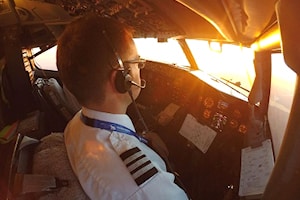 Who am I and where am I now?
Who am I and where am I now?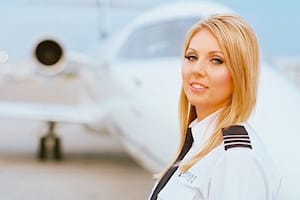 Who am I and where am I now?
Who am I and where am I now?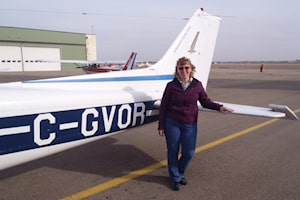 I got my private pilot license in Dec 2012. My story is a little different than most pilots as I did not dream of flying all my life.
I got my private pilot license in Dec 2012. My story is a little different than most pilots as I did not dream of flying all my life.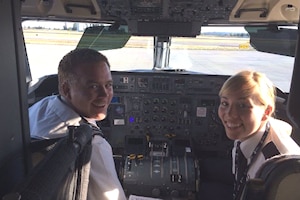 Where are you now?
Where are you now?1.Who Am I And Where Am I Now?
My name is Austen McDonald, and I am a Designer/Flight Validation Pilot at JetPro Consultants Inc and a Q400 First Officer with Jazz Aviation LP in YVR.
Everyone’s path in aviation is different and mine is no exception. I have wanted to fly since I could say the word airplane, but I was diagnosed with Type 1 Diabetes at the age of 14. At the time, this meant that a career as a pilot was prohibited. Despite this, I still wanted to pursue flying as a profession. I was able to get a PPL, Night, IFR, and Multi-Engine rating but the CPL was out of reach due to some antiquated Transport Canada Medical rules about Type 1 Diabetes.
While appealing Transport Canada’s stance on diabetes and flying, I completed a degree in Mechanical Engineering at the UofA while working as a RNAV Approach Designer with the family business. I was fortunately able to build a lot of my time in the companies Piper Seneca III flying coast to coast flight checking approaches in some challenging and remote areas of the country!
After a few years of advocacy, case studies, and meetings in Ottawa, Transport Canada changed their regulations to give individuals with well controlled Diabetes the opportunity to obtain a commercial medical certificate. Subsequently, I became the first person with pre-existing Type 1 Diabetes to receive a commercial pilots license in the world!
I was hired by Jazz Aviation LP in 2019 and continue to design and flight check approaches on the side.
2. Why Did I Choose EFC?
I had great recommendations from family friends about the fleet, instructors, and facilities at EFC! Unfortunately, I never got to experience flying out of YXD but I did get to see and experience what a new airport looks like while at the same time flying the unique DA20 to get my Recreational Pilots License back in 2014!
3. How Did EFC Help My Career?
EFC helped fuel that fire known as “the flying bug” as I was still on the fence about wanting to try and make flying my professional career. My instructor, Brad Keats, was extremely patient and understanding in dealing with the struggles I had with Transport Canada getting my initial medical certificates. EFCs tried and true program built the strong foundation that I used to launch my career from.
4. What Is Your Most Memorable Experience At EFC?
Must be my first solo and the water bucket treatment after I landed! It was the middle of July, so the water bucket was a nice cool off. Years later I came across the same airplane (G-FEFZ) flying in Moncton. I still have the first solo t-shirt but years (and in-flight snacks) later I’ve “out-grown” it.
5. If You Had To Give Advice To Someone Starting Out What Would You Say?
- Patience and consistency! Not everyone’s training or career path is the same nor should it be, but what you can control is how you approach your training and outlook you have going into it.
- Make as many friends as possible – you never know when they might be able to help you get a job!
- Participate in club social events – one of my biggest regrets was not going to the club BBQs or club nights throughout the years! Great way to network, make new friends, talk about airplane. What more could you want?!
- Most importantly – never stop learning!
1.Who Am I And Where Am I Now?
My name is Austen McDonald, and I am a Designer/Flight Validation Pilot at JetPro Consultants Inc and a Q400 First Officer with Jazz Aviation LP in YVR.
Everyone’s path in aviation is different and mine is no exception. I have wanted to fly since I could say the word airplane, but I was diagnosed with Type 1 Diabetes at the age of 14. At the time, this meant that a career as a pilot was prohibited. Despite this, I still wanted to pursue flying as a profession. I was able to get a PPL, Night, IFR, and Multi-Engine rating but the CPL was out of reach due to some antiquated Transport Canada Medical rules about Type 1 Diabetes.
While appealing Transport Canada’s stance on diabetes and flying, I completed a degree in Mechanical Engineering at the UofA while working as a RNAV Approach Designer with the family business. I was fortunately able to build a lot of my time in the companies Piper Seneca III flying coast to coast flight checking approaches in some challenging and remote areas of the country!
After a few years of advocacy, case studies, and meetings in Ottawa, Transport Canada changed their regulations to give individuals with well controlled Diabetes the opportunity to obtain a commercial medical certificate. Subsequently, I became the first person with pre-existing Type 1 Diabetes to receive a commercial pilots license in the world!
I was hired by Jazz Aviation LP in 2019 and continue to design and flight check approaches on the side.
2. Why Did I Choose EFC?
I had great recommendations from family friends about the fleet, instructors, and facilities at EFC! Unfortunately, I never got to experience flying out of YXD but I did get to see and experience what a new airport looks like while at the same time flying the unique DA20 to get my Recreational Pilots License back in 2014!
3. How Did EFC Help My Career?
EFC helped fuel that fire known as “the flying bug” as I was still on the fence about wanting to try and make flying my professional career. My instructor, Brad Keats, was extremely patient and understanding in dealing with the struggles I had with Transport Canada getting my initial medical certificates. EFCs tried and true program built the strong foundation that I used to launch my career from.
4. What Is Your Most Memorable Experience At EFC?
Must be my first solo and the water bucket treatment after I landed! It was the middle of July, so the water bucket was a nice cool off. Years later I came across the same airplane (G-FEFZ) flying in Moncton. I still have the first solo t-shirt but years (and in-flight snacks) later I’ve “out-grown” it.
5. If You Had To Give Advice To Someone Starting Out What Would You Say?
- Patience and consistency! Not everyone’s training or career path is the same nor should it be, but what you can control is how you approach your training and outlook you have going into it.
- Make as many friends as possible – you never know when they might be able to help you get a job!
- Participate in club social events – one of my biggest regrets was not going to the club BBQs or club nights throughout the years! Great way to network, make new friends, talk about airplane. What more could you want?!
- Most importantly – never stop learning!
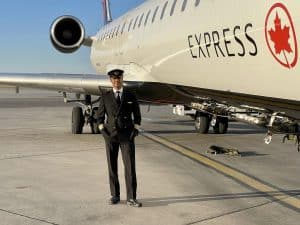
My name is Vinodh Benjamin Bastiampillai and I’m currently a Captain on the CRJ with Jazz Aviation, flying for Air Canada under the Express banner. I’m based in beautiful Vancouver, British Columbia, where I’ve been for the past 5 years. I spent the majority of my life in Edmonton and then later Calgary, where I spent 5 years flying for two other operators. I initially started with Kenn Borek Air as a flight follower and then transitioned to the Twin Otter as a First Officer for a couple years. I then flew for a company called Aries aviation as a Captain on a Navajo for over three years doing survey work in the U.S., South America and all over Canada. I got on with Jazz in February of 2017 and have been enjoying every second of it!
WHY DID I CHOOSE EFC?
After getting my Private Pilots License in Calgary via a scholarship back in 2001, it confirmed that I wanted to definitely do this as a career. Once I got back home to Edmonton where I was living, I looked around at the flight schools and flying clubs available and it was quite an easy decision to go with Edmonton Flying Club. With it’s professional atmosphere and rich history, based out of the Edmonton Municipal Airport at that time, I knew I was in great hands. Soon after, as a back up, and post secondary schooling given a preference for hiring in aviation, I went to the University of Alberta in Edmonton to do a 4 year Bachelor of Physical Education degree in 2002. I kept my flying currency at EFC and did the occasional scenic city tours with family and friends with a bit of time building over the next few years while in School. After University, I went full tilt into starting my Commercial License in 2007 with EFC and building up my time and ratings.
HOW DID EFC HELP MY CAREER?
Just like any new skill learned, the importance of mastering the basics is the foundation to where you can build going forward. It should be a fundamental requirement to get proper training in order to set you up for future successes, and create good/safe habits for the rest of your career. With EFC’s knowledgeable staff and experienced flight instructors, I went through their excellent ground school and successfully passed the written exams and flight test! I also had the pleasure of getting some Multi IFR instruction on their state of the art Flight simulator with EFC’s wonderful addition to the staff and current CFI of EFC, Sophia Wells! The quality of instruction and tools available to better yourself as a pilot are top notch at EFC!
WHAT IS YOUR MOST MEMORABLE EXPERIENCE AT EFC?
Sad to say, but a very memorable experience with EFC was the day of 9-11. If old enough, we all remember where we were and what we were doing on that terrible day. 18 years old and a newly minted Private Pilots License in hand, I had just joined EFC and had my first flight/initial checkout scheduled at 2 pm that afternoon. Along with the rest of the world, I watched in shock and horror at the events unfolding all morning. Just after noon, I got a phone call from my instructor saying that my checkout flight was cancelled as all aircraft in the world are being grounded. Understandably so, that day is forever etched in my mind.
IF YOU HAD TO GIVE ADVICE TO SOMEONE STARTING OUT WHAT WOULD YOU SAY?
Be humble and don’t ever give up! For most of us, this career trajectory is not a straight line up. There are lots of dips and sometimes massive blows to our hopes and confidence. The key is to trust that your hard work and sacrifices, sometimes for many years for some of us, will eventually get you to where you want to go or be. If you have a serious passion for flying and can’t shake off that urge to get back in the sky every time you’re on the ground for a bit, then you are in the right place. I wake up everyday that I have to go to “work” with a huge smile on my face and thankful I get to call this my career!
I am Alexander Harrison and I flew with EFC for my private licence and later on as a flight instructor. Recently, I have been hired as a first officer with CanWest Air. CanWest Air is a great company that does medivac and cargo operations.
I chose EFC for my training based on their fleet and word of mouth. EFC does excellent discovery flights that allow you to get a taste of what flying is like and that’s what got me hooked. Their aircraft systems are great for moving forward within aviation, they allow you to see how more advanced aircraft function and prepare you for the industry.
EFC helped me in a variety of way to help me advance my career. The team instructors at EFC helped me gain experience through answering my questions and helping me with hard to solve problems. Instructing was also a great way to gain hours as an low time pilot. I really enjoyed watching my students succeed and adapting to deferent learning styles.
My memorable experiences with EFC would be the ones around the hanger. EFC has a wide verity of students, instructors, and renters that all have great advice if your new or just getting started. If your just looking to get started with aviation I would highly recommend a discovery flight and come with lots of questions to see if its for you.
1.WHO AM I AND WHERE AM I NOW?
Reese Failing and I’m living in thunder bay as a pilatus pc-12 first officer for north star air
2. WHY DID I CHOOSE EFC?
The initial draw to EFC was simply proximity to my home. I only really had two options one operated at villeneuve and the other was EFC. I actually had done a discovery flight with the other school prior to signing up at EFC. I decided to check EFC because I wanted to make sure that I was exploring all my options. After parking at the airport and seeing EFC for the first time I knew it was a better choice due to parkland being a quieter, simpler airport to operate out of but mainly due to the people that were working that day. Everyone was very friendly and willing to help and answer any questions I had, and they were all smiling and saying hi. It was a much better atmosphere where I felt I would be more comfortable and I was right.
3. HOW DID EFC HELP MY CAREER?
The main thing that EFC taught me was how to prepare and give myself the best possible chance of success. They showed me how to prepare with very thorough studying which meant examiners would have to work hard to find questions I couldn’t answer. EFC also taught me to be comfortable outside my comfort zone. When you’re learning to fly you are going to have many times where you are flying outside your comfort zone but that is wear you will be doing your best learning.
4. WHAT IS YOUR MOST MEMORABLE EXPERIENCE AT EFC?
How dare you make me choose one. There really are so many, but I think I can’t of anything more pivotal than my first solo. This was truly the first moment where I realized that I am capable of this, flying and operating an aircraft solely on my own. It was an amazing moment that gave me the confidence and the drive to power through the rest of my training.
5.IF YOU HAD TO GIVE ADVICE TO SOMEONE STARTING OUT WHAT WOULD YOU SAY?
The best piece of advice I’ve gotten was from my uncle, he would always say. “You’re never ready, it’s just your turn.” That phrase really stuck with me and you will realize how very true it is as you start out. When it’s your turn you will never ever feel ready, but you just have to go and give it everything you’ve got.
1.WHO AM I AND WHERE AM I NOW?
I am Angela Wasylowich, and I am currently flying an Embraer Praetor 500 and a Cessna TTx for a private organization here in Calgary, AB. I started my initial private training at EFC in July of 2018 and went on to finish my commercial/multi-ifr and, finally, my instructor rating by July 2020. I also graduated from Grant MacEwan University, completing a Business Management Diploma Majoring in Aviation. Those two years were a complete whirlwind! Afterwards, I worked as an instructor at EFC until transitioning into my current position!
2. WHY DID I CHOOSE EFC?
I chose EFC after making a last-minute decision to start my flight training and found that Parkland (CPL6) was the closest airport with a flight school to where I lived. I booked a discovery flight, and the rest is history!
3. HOW DID EFC HELP MY CAREER?
EFC helped my career by allowing me to complete my initial training at my own pace while guiding me toward the next steps of my career. Initially, I didn’t consider the possibility of becoming a flight instructor until I had the opportunity to get my instructor rating and ultimately instruct at EFC. Looking back, I’m glad I had this opportunity as I don’t know where I would’ve been after all my training, and I definitely wouldn’t be where I am today.
4. WHAT IS YOUR MOST MEMORABLE EXPERIENCE AT EFC?
One of my most memorable experiences at EFC was finishing my commercial flight test. As a student, it felt like a long-time coming, and it was such a relief and sense of achievement when my examiner, Sophia, said I’d passed! Another memorable experience at EFC was the great company and atmosphere built between students, instructors, and other staff members!
5.IF YOU HAD TO GIVE ADVICE TO SOMEONE STARTING OUT WHAT WOULD YOU SAY?
If I could give advice to someone starting out, I’d recommend two things: patience and consistency! Everyone’s paths are different. Be patient with yourself and stay consistent in your goals/training, and you’ll succeed.
ALUMNI BIOS
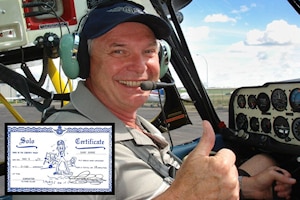 I have been flying for 42 years. When I was just a whippersnapper I used to spend the summers on my grandparent’s farm. As it turns out, the farm was on the V302 airway between YEG and YRM and I would watch with envy as the dozens of planes flew over every day. Then one day a little Piper Tri-Pacer landed in a field next to our farm and I was over like a shot to meet the intrepid aviator and his amazing flying machine. He turned out to be a really nice guy and even let me sit in the cockpit and touch the controls. To this day I am still not sure why he stopped that day. But, from that day forward, I was hooked. Within a few years I was old enough to get into Air Cadets and 504 Squadron provided the opportunity for my first time at the controls of a real airplane, a Beech 18 Expediter, which became the launching platform for my aviation career.
I have been flying for 42 years. When I was just a whippersnapper I used to spend the summers on my grandparent’s farm. As it turns out, the farm was on the V302 airway between YEG and YRM and I would watch with envy as the dozens of planes flew over every day. Then one day a little Piper Tri-Pacer landed in a field next to our farm and I was over like a shot to meet the intrepid aviator and his amazing flying machine. He turned out to be a really nice guy and even let me sit in the cockpit and touch the controls. To this day I am still not sure why he stopped that day. But, from that day forward, I was hooked. Within a few years I was old enough to get into Air Cadets and 504 Squadron provided the opportunity for my first time at the controls of a real airplane, a Beech 18 Expediter, which became the launching platform for my aviation career.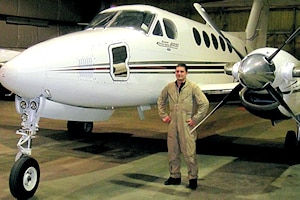 Who are you and where are now?
Who are you and where are now?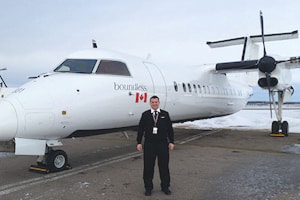 Who am I and where am I now?
Who am I and where am I now?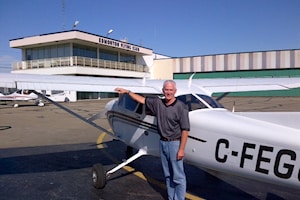 Who am I and what made me decide to get into flying?
Who am I and what made me decide to get into flying?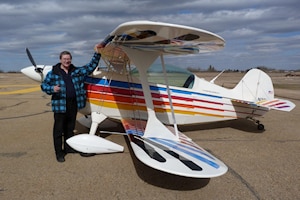 Who am I and what made me decide to get into flying?
Who am I and what made me decide to get into flying?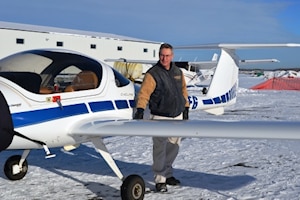 Who am I and what made me decide to get into flying?
Who am I and what made me decide to get into flying?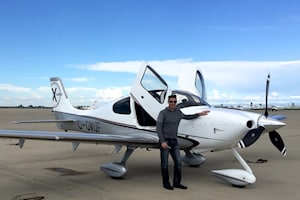 Who am I and what made me decide to get into flying?
Who am I and what made me decide to get into flying?I am Eric Folk and I am currently flying for Integrated Sensing and Surveillance, a pipeline survey company operating out of the hangar next to EFC. I flew at EFC for all my training, right from my private license to commercial. I also had the opportunity to work as a dispatcher at the club for a little over a year and a half starting in 2020.
I chose EFC because of all the recommendations I heard from past students. The staff all seemed inviting and willing to help, and after being there for a while I can say it’s more of a family among everyone than simply a flight school. Especially after working at EFC I can guarantee it’s a great place to learn how to fly and soak up as much information as you want, while also hearing a few stories of course. EFC also offers an excellent fleet of aircraft that are well maintained in-house.
EFC helped me see all the opportunities there are for pilots, allowing me to fly commercially for pipeline surveys. The staff also gave me tools not only to be a safe pilot, but also to be a smart pilot, giving a glimpse into what commercial flying is actually like. The connections and friends I made at EFC will always be something important to me as well.
Although it’s hard to point out one favourite memory at EFC with there being so many, one that stands out would have to be flying with Justin in the Piper Navajo. We flew down to Calgary, up to Bonnyville, then spent a few hours there before dropping passengers off in Calgary and coming back home. It gave me a real feeling of what it’s like to fly as a job, such as the planning and coordination it takes. I had a ton of flying with Justin and getting to know him better. All the memories you can make by simply being in the hangar are also worth mentioning!


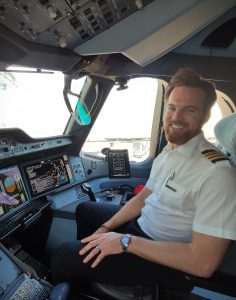
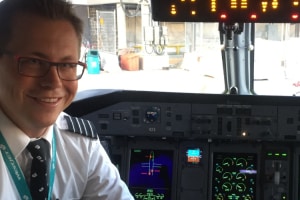 1. Who am I and where am I now?
1. Who am I and where am I now?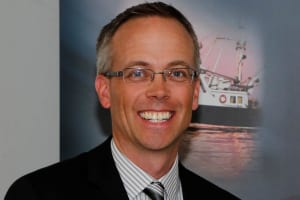 1. Who am I and where am I now?
1. Who am I and where am I now?